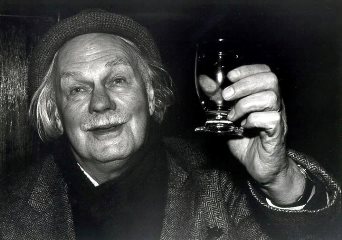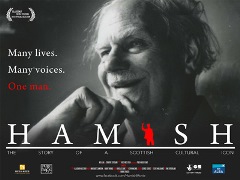
The 15th Carrying Stream Festival
Edinburgh, Scotland
9 - 16 November 2016
www.carryingstreamfestival.co.uk
The 15th Carrying Stream Festival is held in November 2016 by the Edinburgh Folk Club to celebrate the life and legacy of the great Scottish folklorist and writer Hamish Henderson (1919-2002), often referred to as the ‘Father of the Scottish Folk Revival’. The Carrying Stream Festival is celebrating traditional music, song, storytelling and poetry in all their historical and contemporary contexts, presenting established tradition bearers alongside international acts and up-and-coming talents.
Already in February 2016, the Glasgow Film Festival played host to the world premiere of ‘Hamish’,
Robbie Fraser’s film tribute to the many contrary forces and diverse facets of Hamish Henderson’s life as a poet, soldier,
intellectual, activist, songwriter and folk music revivalist.
‘He’s a wee bit lost right now, faded from view’, says Robbie,
‘but he needs to be re-cemented into the Scottish imagination as a poet, a maker and an inspirer of people.’

Hamish Scott Henderson, (11 November 1919 – 9 March 2002; Scottish Gaelic: Seamas MacEanraig (Seamas Mòr)) was a Scottish poet, songwriter, communist, soldier and intellectual.
He has been referred to as the most important Scots poet since Robert Burns and was a catalyst for the folk revival in Scotland. He was also an accomplished folk song collector and discovered such notable performers as Jeannie Robertson, Flora MacNeil and Calum Johnston.
Born to a single mother in Blairgowrie, Perthshire, Henderson eventually moved to England with his mother. He won a scholarship to the prestigious Dulwich School in London; however, his mother died shortly before he was due to take up his place and he was forced to live in an orphanage while studying there.
He studied Modern Languages at Downing College, Cambridge, in the years leading up to World War II, and as a visiting student in Germany, ran messages for a Quaker organization aiding the German resistance and helping to rescue Jews.
Although he argued strongly for peace, even well into the early years of the war, he became convinced that a satisfactory peace could not be reached and so he threw himself into the war effort. Joining as an enlisted soldier in the Pioneer Corps, he later applied for and received a commission in the Intelligence Corps. He was quite effective as an interrogator due to his command of six European languages and deep understanding of German culture.
He took part in the Desert War in Africa, during which he wrote his poem Elegies For the Dead in Cyrenaica, encompassing every aspect of a soldier's experience of the sands of North Africa. On 2 May 1945, Henderson personally oversaw the drafting of the surrender order of Italy issued by Marshal Rodolfo Graziani.
Henderson collected the lyrics to "D-Day Dodgers," a satirical song to the tune of "Lili Marlene", attributed to Lance-Sergeant Harry Pynn, who served in Italy. Henderson also wrote the lyrics to "The 51st (Highland) Division's Farewell to Sicily", set to a pipe tune called "Farewell to the Creeks". The book in which these were collected, Ballads of World War II, was published "privately" to evade censorship, but earned Henderson a ten-year ban from BBC radio, preventing a series on ballad-making from being made. His 1948 poetry book about his experiences in the war, Elegies for the Dead in Cyrenaica, received the Somerset Maugham Award.
Henderson threw himself into the work of the folk revival after the war, discovering and bringing to public attention Jeannie Robertson, Flora MacNeil (see Flora MacNeil, Gaelic singer), Calum Johnston (see Annie and Calum Johnston of Barra) and others. In the 1950s, he acted as a guide to the American folklorist, Alan Lomax, who collected many field recordings in Scotland. (See Alan Lomax, Collector of Songs).
Henderson was instrumental in bringing about the Edinburgh People's Festival Ceilidh in 1951, which placed traditionally performed Scottish folk music on the public stage for the first time as "A Night of Scottish Song". However, the People's Festival, of which it was part, was planned as a left-wing competitor to the Edinburgh Festival and was deeply controversial. At the event, Henderson performed a song, to the tune of Scotland the Brave, which glorified John Maclean, a communist and Scottish nationalist hero.
However, the event marked the first time that Scotland's traditional folk music was performed on a public stage. The performers included Flora MacNeil, Calum Johnston, John Burgess, Jessie Murray, John Strachan, and Jimmy MacBeath. The event was extremely popular and was regarded as the beginning of the second British folk revival.
Henderson continued to host the events every year until 1954, when the Communist ties of several members of the Peoples Festival Committee led to the Labour Party declaring it a "Proscribed Organisation". Losing the financial support of the local trades unions, the Peoples Festival was permanently cancelled. Henderson's own songs, particularly "The Freedom Come All Ye", have become part of the folk tradition themselves.
Dividing his time between Europe and Scotland, he eventually settled in Edinburgh in 1959 with his German wife, Kätzel (Felizitas Schmidt).
Henderson collected widely in the Borders and the north-east of Scotland, creating links between the travellers, the bothy singers of Aberdeenshire, the Border shepherds, and the young men and women who frequented the folk clubs in Edinburgh.
From 1955 to 1987 he was on the staff of the University of Edinburgh's School of Scottish Studies which he co-founded with Calum Maclean: there he contributed to the sound archives that are now available on-line. Henderson held several honorary degrees and after his retirement became an honorary fellow of the School of Scottish Studies. For many years he held court in Sandy Bell's Bar, the meeting place for local and visiting folk musicians.

Henderson was a socialist, and beside his academic work for the University, he produced translations of the Prison Letters of Antonio Gramsci, whom he had first heard of among Communist Italian partisans during the war. The translation was published in the New Edinburgh Review in 1974 and as a book in 1988. He was involved in campaigns for Scottish home rule and in the foundation of the 1970s Scottish Labour Party. Henderson, who was openly bisexual, was vocal about gay rights and acceptance.
In 1983, Henderson was voted Scot of the Year by Radio Scotland listeners when he, in protest of the Thatcher government's nuclear weapons policy, turned down an OBE.
He died in Edinburgh on 8 March 2002 aged eighty-two, survived by his wife Kätzel and their daughters, Janet and Christine.
Henderson's complexities make his work hard to study: for example, Dick Gaughan's commentary on the song-poem The 51st Highland Division's Farewell to Sicily, while insightful, does not take into account the traditional divide between pipers and drummers in the Scots regiments, the essential key to one reading of the text.
In 2005, Rounder Records released a recording of the 1951 Edinburgh People's Festival Ceilidh as part of The Alan Lomax Collection. Henderson had collaborated heavily with the preparations for the release.
In August 2013, Edinburgh University announced that it had acquired his personal archive of "more than 10,000 letters from almost 3400 correspondents, plus 136 notebooks and diaries", dating from the 1930s to the end of his life. These will be kept in the Special Collections department of the main library.
Discussions around national identity and constitutional resettlement in Scotland, especially those surrounding the Scottish Independence Referendum of 2014, have often invoked Henderson's legacy. Politicians and cultural commentators alike describe their admiration for his song 'The Freedom Come-All-Ye' and lend their voices to those touting it as an alternative national anthem. As a radical democrat whose political beliefs were closely bound up in the study of folk culture and high literature, Henderson's work expresses a tension between romantic nationalism and socialist internationalism which has been reaffirmed in public life in Scotland since his death.
|
|

Text is available under the Creative Commons Attribution-ShareAlike License.
Date: October 2016.
Photo Credits:
(1)-(5) Hamish Henderson,
(6) '51st (Highland) Division's Farewell To Sicily',
(7) 'The Freedom Come-All-Ye'
(unknown/website).